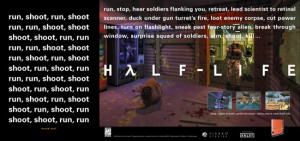Not to say that thinking is a myth in a shooter, but rather that it is a myth that there is a special class of shooter which requires thinking as substantially distinct separation from other shooters.
I’ve been told many times that Half-Life, Half-Life 2, Bioshock, Battlefield, or any number of other games are “the thinking man’s shooters”, whether by fans or developers through implied statements, or direct marketing campaigns.
However this implies, as does the Half-Life advertisement above, that other shooters are comparatively simple. It does this by reducing the terms allowed to describe other games without reducing the terminology available to them. It does this by observing one game with a low resolution, and another with a higher resolution.
The simplest stand alone shooters I can think of are Painkiller and Serious Sam, wherein you battle within discrete arenas against a fixed amount of monsters. Serious Sam offers broader arenas with more unit variety, where Painkiller is in smaller ones with a smaller set of monsters, but with a more involved weapon set, in addition to the card system. As neither game has a regenerating health system, your performance truly matters in each battle as it frames what you are usually working with in the next. To put it simply, dumb players struggle, no matter their aiming skills, in the long run with these games. To get even more simplistic you would have to reach for something like the InstaGib mode found in the Unreal Tournament franchise. Even here though, player movement, lines of sight, spawn systems, and the psychology involved in multiplayer still yields a system that requires consideration. The player who doesn’t think leaves a margin of error that less skilled opponents can often overcome.
So by what behavior do some games acquire the title of being for those who think yet still remaining a shooter? The first is through advertising and marketing. Simply telling people that it is, and telling people that if they play it, they are being thoughtful. It creates a degree of investment. “I should try this game as it involves thinking, and clearly I like thinking. I am playing this game, so I am engaging in thinking, this places me above those who play games unlike it. This game enhances my position as a thinker because it shows yet another facet of my life in which I think.” You now have a fierce defender of the game, and an advocate for it as a thinking shooter. It matters little how much thinking is being done, so long as they generally like the game and its trappings match their expectations of what thinking is like in the context of video games.
The second is the game mechanics themselves. No, not mechanics that require you to think, most do, or at least reward the thinker above the non-thinker when it comes to execution. Time. Longer respawn timers, long distances between objectives, numerous steps to simple tasks. Things in which they can consider any options for longer, where they have time to mull potentialities over. It isn’t that they are thinking any more, but rather that they are thinking for longer. The result is that slower thinkers arrive at the same conclusion as the faster thinkers, and the ineffective thinkers are impressed by all the factors to consider. In a faster game the slower thinkers don’t finish their thought and end up falling back on instinct which makes them less equipped, and the ineffective thinkers don’t have time to comprehend the complexity before them. In both cases they are forced to fall back on instinct and reflex, thus concluding when they lose that they just don’t have the skill, but their intellect could make the difference if the game rewarded thinking, and when they win, that it proves that the game is nothing but instinct, because they didn’t use their intellect.
The real trick is to think about the games in depth when you are not playing them, to consider outcomes and options, to watch competitive matches and simply analyze what is happening. Then you do not need as much time, your mind is familiar with the terrain of possibilities and you need only process the few unique traits.
If you want a thinking game, think. The more interesting games will reward it.
